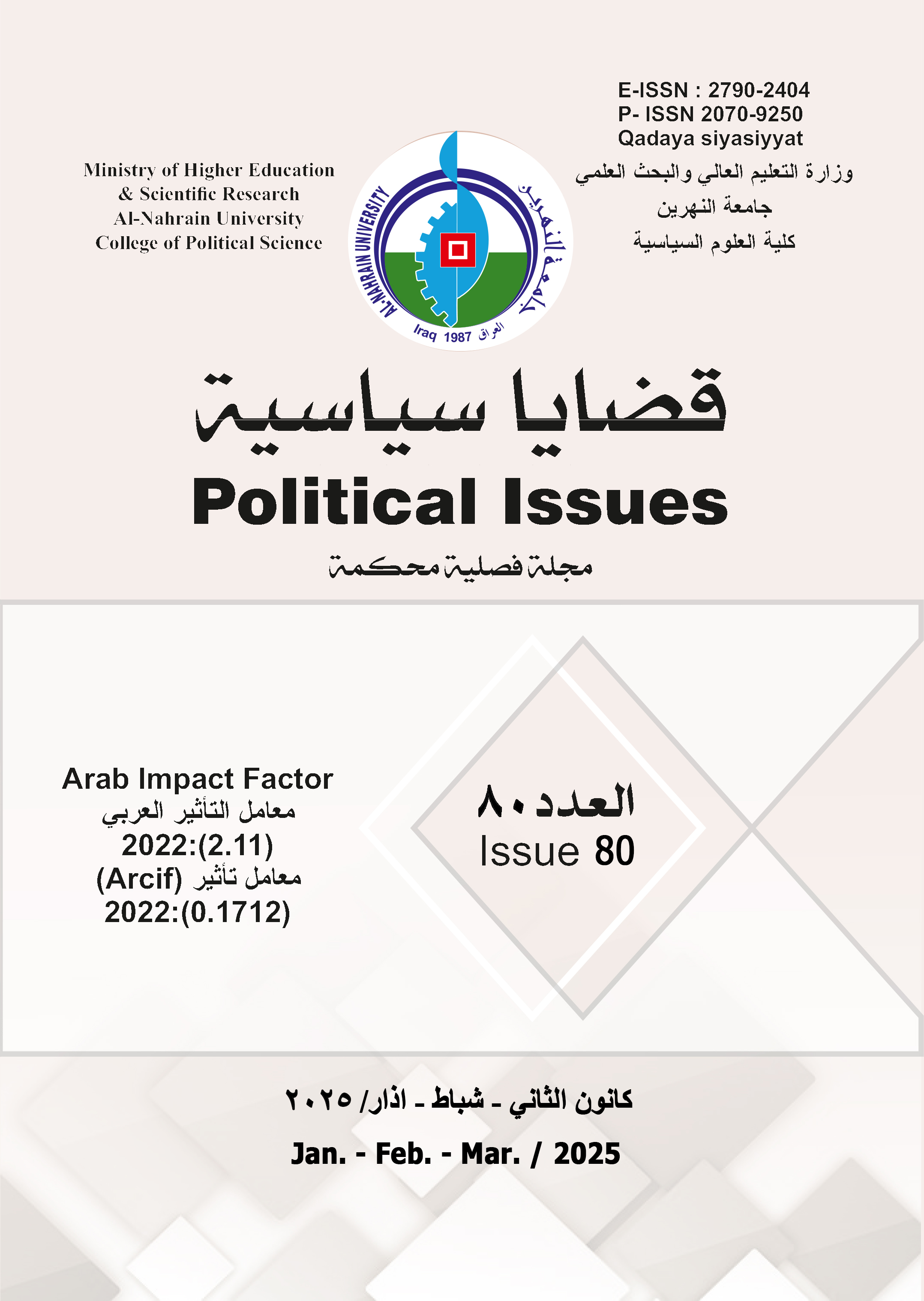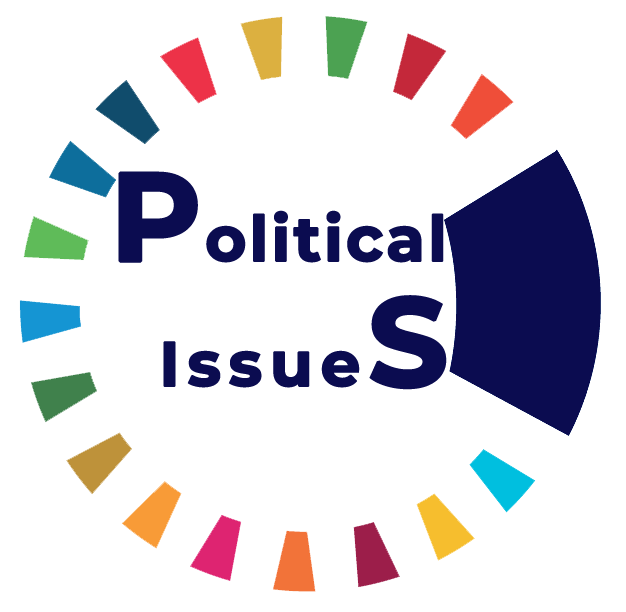The paths of democratic construction in Algeria and their impact on the effectiveness of the political system
DOI:
https://doi.org/10.58298/802025695Keywords:
: Algeria, constitutional authorities, parties,, civil society.Abstract
The move towards adopting the democratic principle in political organization requires the availability of a set of political foundations linked to its cultural frameworks that enhance its activities through which society interacts with its political reality, and then formulates its vision and requirements in light of the participation that grows with the response it receives from the political organization. Therefore, the mature political process is not based on foundations and institutions that lack a function and a balanced role within the system of political interaction or that are devoid of democratic practice. Therefore, what is noted about the political system in Algeria is that it has produced a tight political and organizational situation in favor of the position of the President of the Republic, reinforced by the constitutional document that placed him in an exceptional position from the balance of powers, as his decision is effective on various state institutions. The practice has also granted more monopoly of powers and the acquisition of their privileges, which has become one of the sources of its political legitimacy that has absent the peaceful transfer of power, as well as the inactivity of civil social organizations and their parties from practicing their activities in influencing the outputs of power or participating in the political decision, which justifies their existence as part of completing the form of the system, not being one of the means of political participation or a source for developing political capabilities and sustaining their activities that maintain On the stability of the system and its effectiveness, the research was devoted to identifying the sources of imbalance in the political organization of Algeria and developing effective solutions to address the reality and increase the outcomes of political performance.
References
First: The Algerian Constitution of 1996, amended.
Second: Books and studies
(1) Shabahi Kenza and Habibi Nasira, Adapting the Algerian Political System in Light of Parliamentary Monopoly, Master's Thesis, Akli Mohand Oulhadj University, Faculty of Law and Political Science, Algeria, 2017.
(2) Saleh Belhadj, Political Institutions and Constitutional Law in Algeria from Independence to Today, Office of University Publications, Algeria, 2010.
(3) Mar Kamal Ali, The Structure of Political Power in Algeria and Its Impact on Public Policy, PhD Thesis, University of Algiers 3- Faculty of Political Science and International Relations, Algeria, 2019,
(4) Ismail Qira and others, The Future of Democracy in Algeria, DN, Lebanon, 2002
(5) Aqila Khriachi, The Center of the National Assembly in the Algerian Constitutional System, PhD Thesis, University of Hadj Lakhdar Batna- Faculty of Law and Political Science, Department of Legal Sciences, Algeria 2010.
(6) Ali Burjah and Najib Boujajah, The Principle of Separation of Powers in Light of the 1996 Constitution, Master's Thesis, Abdelrahman Mira University, Bejaia- Faculty of Law and Political Science- Department of Public Law, Algeria, 2013
(7) Bashir Tawaleb and Mohamed Ben Sania, The Development of the Algerian Political System in the 1996 Constitution, Unpublished Master's Thesis, University of Ghardaia- Faculty of Law and Political Science- Department of Law, Algeria, 2020, p. 24.
(8) Nadia Khalfa and Lohani Habiba, Parliamentary Oversight of Government Actions in Light of the Constitutional Amendment of 2020, Studies for Academic Studies, Issue 20, Algeria, 2022.
(9) Masoudi Talha and Haimi Nasser El-Din, The Algerian Political System in Light of the Constitutional Amendment of 2020, Master's Thesis, University of Bejaia - Faculty of Law and Political Science, Algeria, 2021.
(10) Hisham Draji, Attempts at Political Reform in Algeria, Journal of Rights and Freedoms, Issue 5, Algeria, 2019.
Abdeljalil Miftah, Mechanisms of Mutual Oversight between Authorities and Their Implications in Light of Political Pluralism in Algeria, PhD Thesis, University of Biskra, Algeria, 2007.
(11) Saeed Bouchaer, The Algerian Political System, An Analytical Study of the Nature of the Governing System in Light of the 1996 Constitution: Legislative Authority and Oversight, Algeria, 2013.
(12) Nasser Jabi, Social Movements in Algeria Between a Crisis The nation state and the cracks in society, from the research of the symposium on social movements in the Arab world, Arab Research Center, Cairo, 2003.
(13) Hanan Miftah, The President of the Republic between the Algerian and American Constitutions, a comparative study, Master’s thesis - University of Batna, 2004, Algeria.
(14) Mohamed Ouma Youf, On the Presidential Nature of the Algerian Political System, PhD Thesis in Law, Faculty of Law and Political Science, Dar Houma University, Algeria, 2005
(15) Boukafa Abdellah, The Algerian Constitution: Its Origin, Provisions, and Determinants, Dar Al-Rayhana for Publishing and Distribution, Algeria, 2002
(16) Meziani Lounes, Selecting Sovereignty for Parliament in Light of the Algerian Constitution (1996), Master’s Thesis, Mouloud Mammeri University - Faculty of Law and Political Science, Algeria, 2011
(17) Wario Mohamed, The Executive Authority in the Algerian Constitutional System between Unity and Duality, PhD Thesis, University of Algiers - Faculty of Law, Algeria, 2012
(18) Boukafa Abdellah, A Brief Introduction to Constitutional Law (The Algerian Constitution, Its Origin in Jurisprudence and Legislation), 4th ed., Dar Al-Hoda for Publishing and Printing, Algeria, 2010.
(19) Amar Awadi: Administrative Law, National Book Foundation and University Publications Office, Algeria, 2005
(20) Saeed Bou Shair, The Algerian Political System, Dar Al-Hoda for Printing and Publishing, Algeria, 1993.
(21) Zarrouk Hakim, The Political and Legal Development of the Position of Prime Minister in the Algerian System, Master's Thesis, University of Algiers - Faculty of Law and Political Science, 2004.
(22) Fawzi Oussedik, The Mediator in Political Systems and Constitutional Law, 1st ed., Dar Al-Kitab Al-Hadith, Algeria, 2000,
(23) Lobna Qaid and Gharboun Rokia, The Political Responsibility of the Prime Minister in the Algerian Constitutional System, Master's Thesis, University of Merbah Ouargla - Faculty of Law and Political Science, Algeria, 2012.
(24) Ahmed Marah, The Impact of the Constitutional Amendment of 2008 on the Relationship between the Legislative and Executive Authorities, Master's Thesis, Abu Bakr Belkaid University - Faculty of Law and Political Science, Algeria, 2015.
(25) Miloud Dhabih, Separation of Powers in the Algerian Constitutional Experience, Dar Al-Hoda for Printing and Publishing, Algeria, 2011.
(26) Abdel Jalil Miftah, Mechanisms of Mutual Control between Authorities and Their Implications in Light of Political Pluralism in Algeria, PhD Thesis, University of Biskra, 2008
(27) Chikhi Chafik, Lack of Functional Independence of Judges in Algeria, Master’s Thesis, University of Tizi Ouzou - Faculty of Law and Political Science, 2010.
(28) Fawzi Oussedik, Al-Wafi in Explaining Constitutional Law, Part 3, University Publications Office, Algeria, 1994.
(29) Ben Mansour Abdel Karim, Judicial Duality in Algeria, PhD Thesis, Mouloud Mammeri University - Faculty of Law and Political Science, Algeria, 2015.
(30) Miloud Dhibih, Separation of Powers in the Algerian Constitutional Experience, Dar Al-Hoda for Printing and Publishing, Algeria, 2007.
(31) Dhir Bin Amou Sader, Separation of Powers and Independence of the Judiciary, As-Sabah Magazine of the Tunisian Republic, Issue 16, Tunis, 2014.
(32) Abdullah Boukafa, The Algerian Constitution: Its Origins, Provisions, and Limitations, previously cited source, p. 234.
(33) Zahwa Bouchaala and Kahina Beloz, The Legal Status of the Constitutional Council in the Algerian Political System, Master’s Thesis, Abdel Rahman Mira University, Algeria, 2014
(34) Saeed Fathi and Fenazi Iman, The Status of the Constitutional Council in the Algerian Political System, Master’s Thesis, Sheikh Al-Arabi Al-Tabsi University - Faculty of Law and Political Science, Algeria, 2017,
(35) Fathallah Al-Ghazi, Constitutional and Political Systems of the Maghreb Countries: A Critical Approach, (Proceedings of the Marrakesh Symposium, 15-26-28 October (1999)
(36) Ahmed Al-Rashidi, The Legislative Institution in the Arab World, Center for Political Research and Studies, Beirut, 1997.
(37) Ismail Qira and others, The Future of Democracy in Algeria, 1st ed., Center for Arab Unity Studies, Beirut 2002.
(38) Fathallah Al-Ghazi, Constitutional and Political Systems of the Maghreb Countries: A Critical Approach, (Proceedings of the Marrakesh Symposium, October 15-26-28), Maghreb, 1999.
(39) Massensen Charbi, Four Years After the February 24, 2019 Movement in Algeria: Between Judicial Repression and the Strengthening of Authoritarian Rule, Arab Reform Initiative, Tunis, 2023.
(40) Hanad Muhammad, The Algerian Political System: A Break or Continuity of Society’s Awareness of Itself About Civil Society in the Maghreb, 1st ed., Dar Toubkal for Publishing, Maghreb - Casablanca, (1998).
(41) Khadir Aisha and Tawir Freha, The Nature of the Political System and Its Impact on Public Policy in Algeria, Master’s Thesis, Ziane Achour University - Faculty of Law and Political Science, Algeria, 2019.
(42) Adel Touati and Tariq Badi, Social Policy and Its Impact on the Stability of the Political System in Algeria, Master’s Thesis, Martyr Hama Lakhdar University in El Oued - Faculty of Law and Political Science, Algeria, 2019.
(43) Qusay Hussein, Archaeology of Corruption and Power, University Library, Dar Al-Bahar, Beirut, 2009.
(44) Kreibish Nabil, The Problem of Political Change in Algeria, Journal of Political Science, Issue 59, Baghdad, 2020, p. 265
(45) Omar Farhati, Arab Political Systems between Negative Stability and Positive Change, Journal of Human Sciences, Issue 20, 2002
(46) Lounis Fares, Identity Policy in Political Parties in Algeria (1989-2012), Master's Thesis, Dr. Taher Moulay University - Faculty of Law and Political Science, Algeria, 2012.
(47) Bilal Mawazi, Civil Associations as a Basis for Activating Political Development in Algeria, Journal of Jil for Political Studies and International Relations, Issue 1, Algeria, 2015.
(48) Souad Ben Qaqqa, Political Participation in Algeria, Family Codification Mechanisms as a Model (1962-2005), PhD Thesis, University of Mohamed Kheider Biskra - Faculty of Humanities and Social Sciences - Department of Social Sciences, Algeria, 2011.
(49) Lounis Fares, Identity Politics in Political Parties in Algeria (1989-2012), Master's Thesis, Moulay Said University - Faculty of Law and Political Science, Algeria, 2012.
(50) Mohamed Boudiaf, Democratic Transition Forum, University Publication, University of M'sila, Algeria, 2015
(51) Fathi Daim, Democratic Transition in Algeria: Reality and Prospects, Master's Thesis, Abdelhamid Badis University Mostaganem - Faculty of Law and Political Science, Algeria, 2019.
(52) Mounir Sawalhia, Values and Strategies of the Political Elite and Their Relationship to Governance in Algeria: A Field Study in the Algerian Parliament, PhD Thesis, University of Algiers - Faculty of Humanities and Social Sciences, 2008,
(53) Zenati Fouad, The Evolution of the Governing System and the Problem of Political Stability in Algeria, available at the email: https://asjp.cerist.dz/en/article/80963,2024/10/22, 10:00pm(54)
(55) Abdelkader Abdelali, Political Reforms and Their Possible Results after the Legislative Elections in Algeria, Beirut: Arab Center for Research and Political Studies, 2012.
(56) Aji Abdel Nour, The Experience of Multipartyism in Algeria and Democratic Transition: An Applied Study in Algeria. Cairo: Dar Al-Kitab Al-Hadith. 2010,
(57) Mohamed Amzian, The Authoritarian State in the Arab World: Historical Roots and Formation of Political Elites, Algerian Journal of Political Studies, Issue 26, Algeria, 2020,
(58) Mosaab Shanin, The Impact of Political Stability on Political Development in Algeria, Master's Thesis, University of Kasdi Merbah - Faculty of Law and Political Science, Algeria, 2012
(59) Omar Abed, Civil Society in Algeria and its Role in Political Development, Master's Thesis, University of Ouargla - Faculty of Law and Political Science, Algeria, 2015
(60) Mohamed Majdan, Civil Society in Algeria and the Process of Democratic Transition, Political Journal of Algerian Studies, Issue 7, Algeria, 2020
(61) Mohieddine Bayadi, Civil Society in the Maghreb Countries, Its Role in Political Development, Master's Thesis, University of Biskra - Faculty of Law and Political Science, 2012
(62) Dalila Slimani and Kenza Dlimi, The Effects of Administrative Corruption on the Political System Algerian (2000-2017), Master's Thesis, Ahmed Draia University - Faculty of Law and Political Science, Algeria, 2019
(63) Shahida Abu Bakr, The Principle of Separation of Powers in the Constitutional System in Algeria, Master's Thesis, Abdelhamid Ibn Badis University Mostaganem, Algeria, 2019,
Additional Files
Published
Issue
Section
License
Copyright (c) 2025 جعفر الصادق مهدي

This work is licensed under a Creative Commons Attribution 4.0 International License.
This is an Open Access article distributed under the terms of the creative commons attribution (CC BY) 4.0 international license which permits unrestricted use, distribution, and reproduction in any medium or format, and to alter, transform, or build upon the material, including for commercial use, providing the original author is credited.






